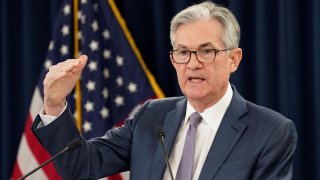
- Federal Reserve officials agreed at their December meeting to make sure the public gets plenty of notice before the central bank’s bond purchases are reduced.
- Meeting minutes released Wednesday showed the Federal Open Market Committee was largely in agreement about the program.
- Markets were looking for whether some members were in favor of changing the program, but the minutes indicated little move in that direction.
The Federal Reserve will do what it can to prevent a taper tantrum when it finally decides to scale back on its bond purchases, minutes from the central bank's most recent meeting showed Wednesday.
Following a two-day session Dec. 15-16, the policymaking Federal Open Market Committee voted to keep its benchmark short-term interest rate anchored near zero.
Markets, though, were focused on discussion surrounding the Fed's asset purchase program. The central bank has been buying at least $120 billion in Treasurys and mortgage-backed securities each month, and at the meeting pledged to keep doing so until it sees "substantial further progress" towards its goals regarding inflation and employment.
Minutes noted unanimous approval around the "outcome-based" approach to the program, though members noted that doesn't mean the purchases will be tied to specific numeric goals.
Officials agreed that markets would get plenty of notice before the asset purchases were curtailed. The last time the Fed cut back on its asset purchases, it triggered a "taper tantrum" in the market that officials want to avoid this time.
Money Report
"Various participants noted the importance of the Committee clearly communicating its assessment of actual and expected progress toward its longer-run goals well in advance of the time when it would be judged substantial enough to warrant a change in the pace of purchases," the minutes said.
Members further noted that once the "substantial further progress" threshold has been reached, the tapering of purchases would be "gradual" and along the lines of what the Fed did starting in 2013. During the previous reduction of purchases, the Fed cut how much it was buying each month. Later, it allowed a capped amount of proceeds from the bonds it was still holding roll off each month while reinvesting the rest.
There had been some anticipation that the committee either might accelerate the pace of purchases or extend the duration of the bonds. The latter move would be an effort to stimulate the economy through lowering longer-term interest rates.
Though markets were watching for how much favor committee members had to adjust the duration of purchases, the minutes noted that only "a couple" officials indicated they were "open to" the idea of buying longer-dated bonds.
Also at the meeting, members adjusted their economic estimates for the next several years. On balance, the committee grew less pessimistic about economic growth than it was in September and lowered its projections for the unemployment rate.
Officials noted that the economic data around the time of the meeting was mostly better than expected, but the accelerate Covid-19 spread was posing a challenge and growth overall remained considerably below its pre-pandemic level.
"They noted that the economic recovery thus far had been stronger than anticipated — suggesting greater momentum in economic activity than had been previously thought — but viewed the more recent indicators as signaling that the pace of recovery had slowed," the minutes stated. "With the pandemic worsening across the country, the expansion was expected to slow even further in coming months."
There was virtually no change in the post-meeting statement from the previous meeting except for the language around asset purchases.






